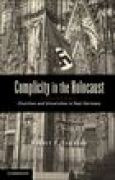
Complicity in the holocaust: churches and universities in nazi germany
Ericksen, Robert P.
Argues that enthusiasm for Hitler within churches and universities effectively gave Germans permission to participate in the Nazi regime. In one of the darker aspects of Nazi Germany, churches and universities grew to accept and support Nazi ideology. Complicity in the Holocaust describes how the state's intellectual and spiritual leaders enthusiastically partnered with Hitler's regime. Ericksen also examines Germany's flawed yet successful postwar policy of denazification in these institutions. In one of the darker aspects of Nazi Germany, churches and universities grew to accept and support Nazi ideology. Complicity in the Holocaust describes how the state's intellectual and spiritual leaders enthusiastically partnered with Hitler's regime. Ericksen also examines Germany's flawed yet successful postwar policy of denazification in these institutions. In one of the darker aspects of Nazi Germany, churches and universities – generally respected institutions – grew to accept and support Nazi ideology. Robert P. Ericksen explains how an advanced, highly educated, Christian nation could commit the crimes of the Holocaust. This book describes how Germany's intellectual and spiritual leaders enthusiastically partnered with Hitler's regime, thus becoming active participants in the persecution of Jews, andultimately, in the Holocaust. Ericksen also examines Germany's deeply flawed yet successful postwar policy of denazification in these institutions. Complicity in the Holocaust argues that enthusiasm for Hitler within churches and universities effectively gave Germans permission to participate in the Nazi regime. Advance praise: 'Based on decades of his own research and complete mastery of both German- and English-language scholarship in the field, Robert Ericksendemonstrates convincingly how a critical mass of churchmen and academics in Germany enthusiastically embraced the Nazi regime and provided the rationalizations and adjustment of moral norms that permitted ordinary Germans to accept and even implement the regime's brutal and murderous policies.' Christopher R. Browning, Frank Porter Graham Professor of History, University of North Carolina, Chapel Hill 'Robert P. Ericksen has given us a masterful comparative studyof the churches and the universities in Nazi Germany. Two institutions entrusted to foster the collective conscience and intellect of the German people arerevealed to have compromised their integrity by collaborating in the Holocaust, despite the fact that Jews had been crucial in creating Christianity (Jesusand Paul) and enhancing German academic scholarship.' Susannah Heschel, author of The Aryan Jesus: Christian Theologians and the Bible in Nazi Germany (2008) 'Robert P. Ericksen's reputation as an important authority on Nazi Germany and the Holocaust is based not only on his careful and original scholarship, but also on his insistence on moral clarity. He does not shirk from assigning individual and collective responsibility for the crimes of Nazism. This book makes compelling reading, and will most certainly stimulate debate among its many readers.' Alan E. Steinweis, University of Vermont INDICE: 1. Why the Holocaust matters in a century of death; 2. Churches and the rise of Hitler; 3. Universities and the rise of Hitler; 4. Consent and collaboration: the churches through 1945; 5. The intellectual arm: universitiesthrough 1945; 6. Repressing and reprocessing the past: denazification and itslegacy of dissimulation; 7. A closer look: denazification at Göttingen University; 8. Implications.
- ISBN: 978-1-107-01591-3
- Editorial: Cambridge University
- Encuadernacion: Cartoné
- Páginas: 280
- Fecha Publicación: 05/02/2012
- Nº Volúmenes: 1
- Idioma: Inglés
